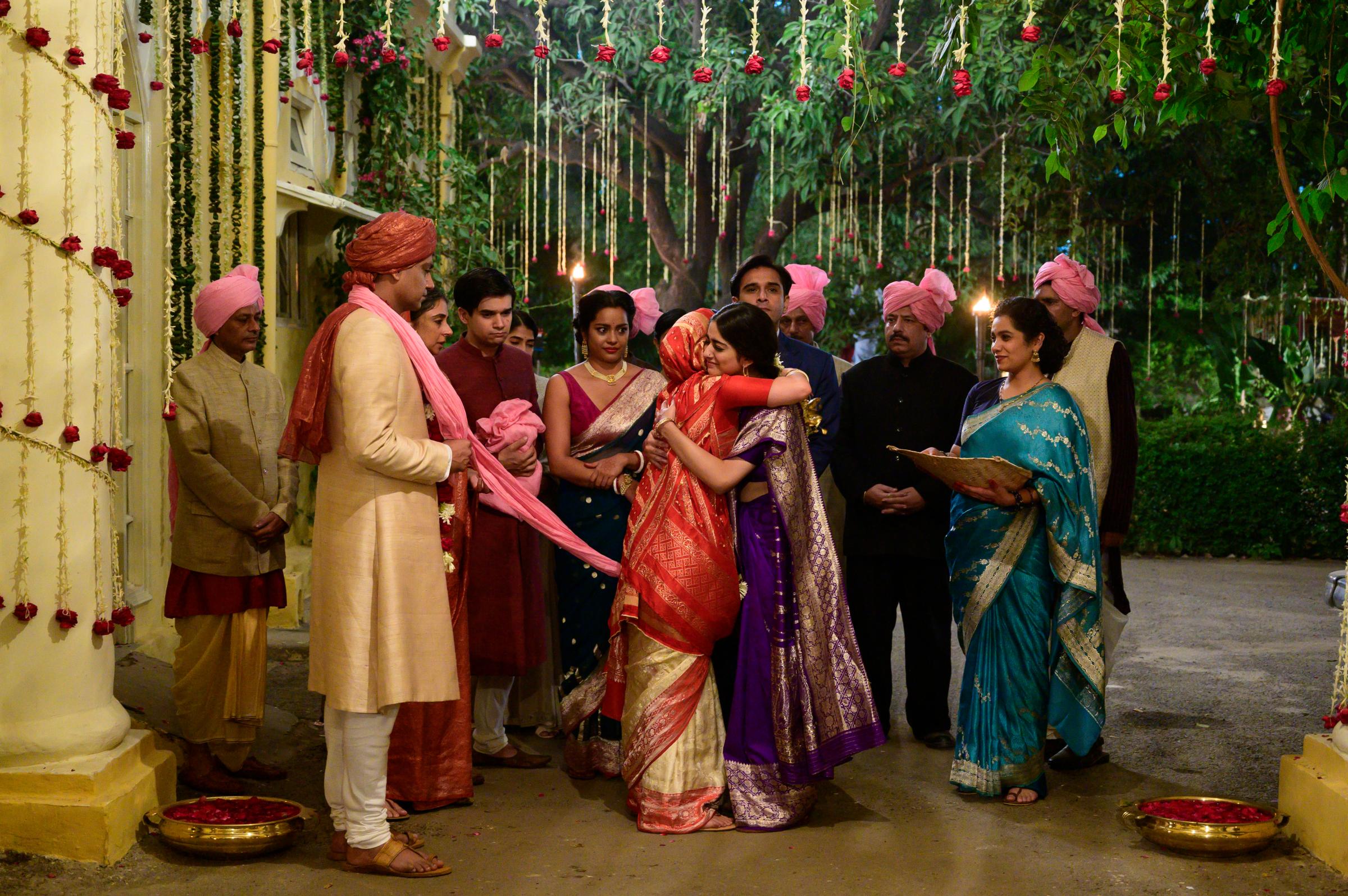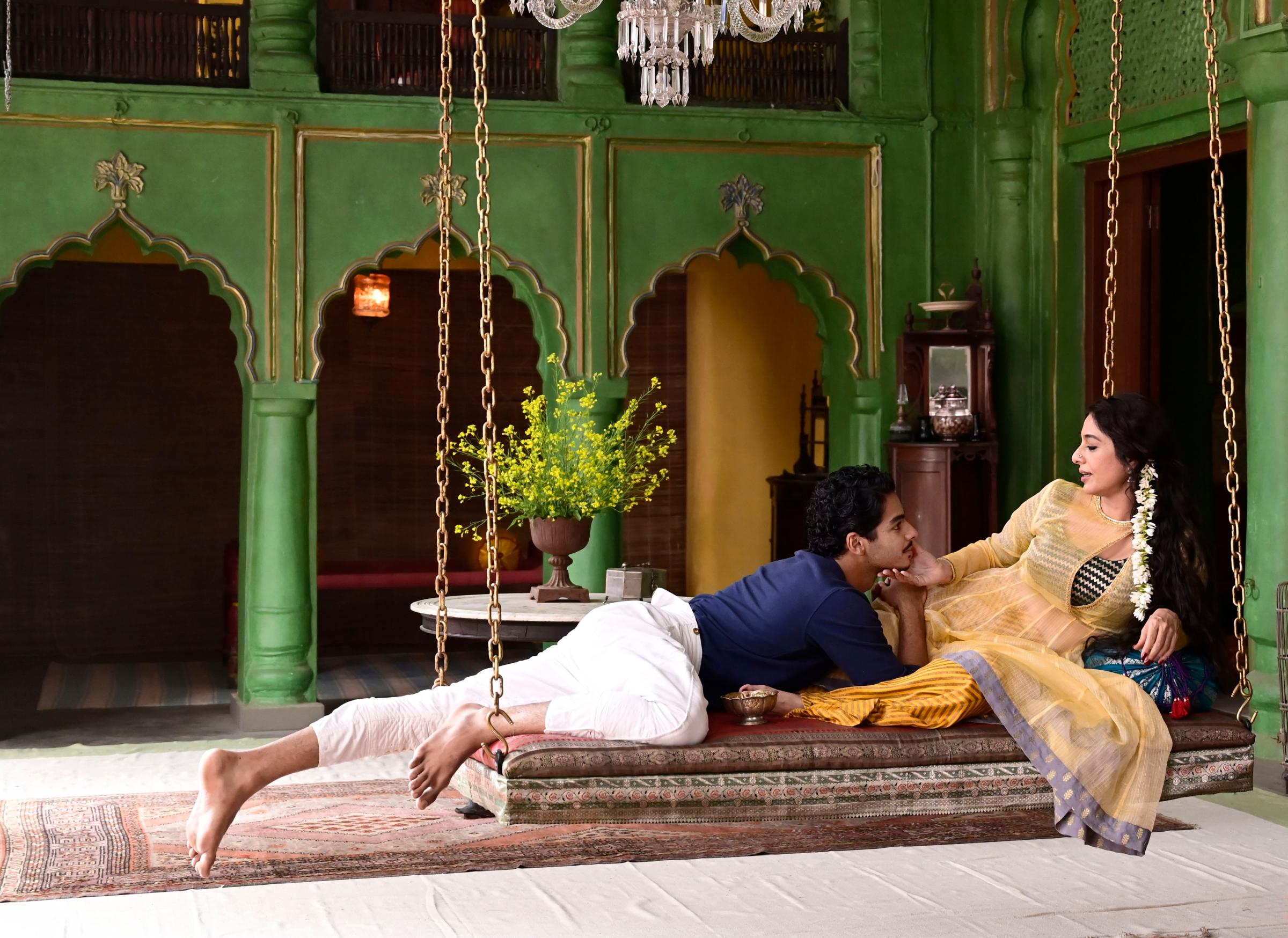Mira Nair knows how to throw a party. From the intimacy of a Southern cookout in the director’s indie gem Mississippi Masala, to the decadence of a British ball on the eve of Waterloo in her Vanity Fair, to the exuberance of a homecoming parade for a Ugandan chess prodigy in Queen of Katwe, she uses the eyes and ears to engage all five senses. Her gorgeous film Monsoon Wedding follows the preparations for an extravagant Indian nuptial celebration saturated with music, dancing and torrential rain. Nair has the remarkable ability to transport a person lounging on their 21st-century American sofa to the center of a blowout centuries or continents away.
Amid this long year of isolation, such an aesthetic signature practically qualifies as a superpower. It certainly makes the arrival, on Dec. 7, of Nair’s recent British miniseries A Suitable Boy on the Anglophile streaming service Acorn TV extra enticing. Adapted from Vikram Seth’s sprawling 1993 novel of the same name—one of the longest in the English language—the six-part epic made overdue history in the UK as the first BBC period drama to feature an entirely South Asian cast. The script, from doyen of the genre Andrew Davies, a writer known for his beloved ’90s Pride and Prejudice adaptation among dozens of other canonical literary adaptations, comes off as both rushed and overly safe, as though Davies felt uncomfortable engaging too deeply with the book’s politics. It’s Nair, a masterful director of not just parties but also actors, who imbues the show with meaning as well as pleasure.
The story opens with—what else?—a lavish, blossom-strewn outdoor wedding in the fictional North Indian city of Brahmpur. It’s 1951, just four years after the bittersweet pairing of independence and partition. The marriage is an arranged one, between Savita Mehra (Rasika Dugal) and Pran Kapoor (Gagan Dev Riar), virtual strangers whose union links two respectable families. “How can she be so happy?” Savita’s little sister Lata (played by a luminous newcomer, Tanya Maniktala) wonders aloud to Pran’s little brother Maan (Ishaan Khatter). “I know your brother better than Savita does. He’s my English lecturer. And she’s only met him once before today, for one hour, chaperoned.” Just as you can see that Lata is our hero by the way her shimmering violet sari outshines even Savita’s bridal red, you can tell these younger siblings are trouble by the looks of confusion that cross their faces at the idea of making a traditional match.

Lata’s and Maan’s paths diverge from there, resulting in parallel narratives with almost irreconcilably different tones. Hers is a sort of updated Jane Austen marriage plot, complete with the most lovably headstrong, bookish protagonist this side of Elizabeth Bennet. An English literature major who refuses to be constrained by a fusty professor’s ideas about which authors are and aren’t appropriate for a young woman to study, Lata can’t imagine marrying at all until she falls suddenly and hopelessly for a handsome schoolmate, Kabir (Danesh Razvi). By the time she learns he’s a Muslim, they’re in love. (In an unfortunate sign of regressive times, a kiss between the two characters has already enraged Hindu nationalists in India.) When Lata’s loving but conventional mother Rupa (Mahira Kakkar), a widow determined to make strong matches for her four children, finds out, she sweeps the girl off to Calcutta, where Lata’s snobby brother Arun (Vivek Gomber) lives with his cartoonishly conniving, unfaithful wife Meenakshi (Shahana Goswami).
Thus begins the search that gives the story its name; the word suitable must come out of Rupa’s mouth at least three times per episode, hammering home just how unromantic her vision for Lata’s future sounds. Two new suitors emerge. Meenakshi’s famous poet brother Amit (Mikhail Sen) is a dashing yet worryingly conceited, self-involved presence. Rupa’s pick Haresh (Namit Das) is just the opposite: a kind, upwardly mobile, average-looking and perhaps boring shoe manufacturer who makes no attempt to conceal his interest in Lata. Meanwhile, there’s still Kabir lingering in the background of her life like an especially tenacious recurring dream.
Lata’s quandary becomes the show’s central focus—which is for the best, because it plays to Nair’s strengths without taking Davies too far out of his comfort zone. The writing capitalizes on Seth and his protagonist’s fondness for giants of British literature, from Shakespeare to Thomas Hardy. Nair’s camera drinks in the mahogany shelves and parquet floors of a bookstore, the streets illuminated by golden fireworks on New Year’s Eve, the glittery glamor of a mid-century Calcutta nightclub. And Maniktala is a perfectly cast rom-com lead, charming enough to keep viewers rooting for her through all the moodiness and ambivalence.

Much weaker, unfortunately, is the secondary story line that follows Maan. Like Lata (though already, against his will, engaged) he becomes infatuated with a Muslim. The object of his affection is even less, ahem, suitable than Kabir: an aging singer and courtesan named Saeeda, played by the mononymous Indian megastar Tabu. Her stirring vocal performances bring a taste of Bollywood to the typical BBC palate, but the couple’s darker narrative gets weighed down by melodrama—and the show’s attempt to depict the rise of Hindu nationalism through Maan’s stormy relationship with his finance-minister father (Ram Kapoor) can feel frustratingly vague. While his Austen riffs work, Davies can’t quite manage an Indian variation on Thackeray or Tolstoy. Their novels zoom out from the lives of individual characters to encompass the political zeitgeist of their times; you can see why those books, as well as Seth’s A Suitable Boy, are doorstoppers.
Given just six hour-long episodes—less than one hour per 200 pages of text—and a glaringly apparent lack of interest on the part of the miniseries’ makers, Maan’s plot gets short shrift. That’s a shame, because, unlike six-seasons-and-a-movie juggernaut Downton Abbey, the novel actually seems rich enough to merit a multi-season adaptation. As is, Nair’s visuals provide deeper, more nuanced political subtext than Davies’ script. Through her eyes, we observe a handful of young adults and the new nation they’ve inherited experiencing similar growing pains. This India is a place still reeling from colonial culture—where Hindu families gather for luncheons at tables decked out in red and green for Christmas, men in Western suits dance with women in saris and the lingua franca of an enormous multilingual population is the native tongue of occupiers. Nair may specialize in candy for the senses, and who could blame a person, these days, for gorging themselves on it? But to the extent that A Suitable Boy transcends escapism, it’s because she brought the substance along with the sparkle.
More Must-Reads from TIME
- Cybersecurity Experts Are Sounding the Alarm on DOGE
- Meet the 2025 Women of the Year
- The Harsh Truth About Disability Inclusion
- Why Do More Young Adults Have Cancer?
- Colman Domingo Leads With Radical Love
- How to Get Better at Doing Things Alone
- Michelle Zauner Stares Down the Darkness
Contact us at letters@time.com